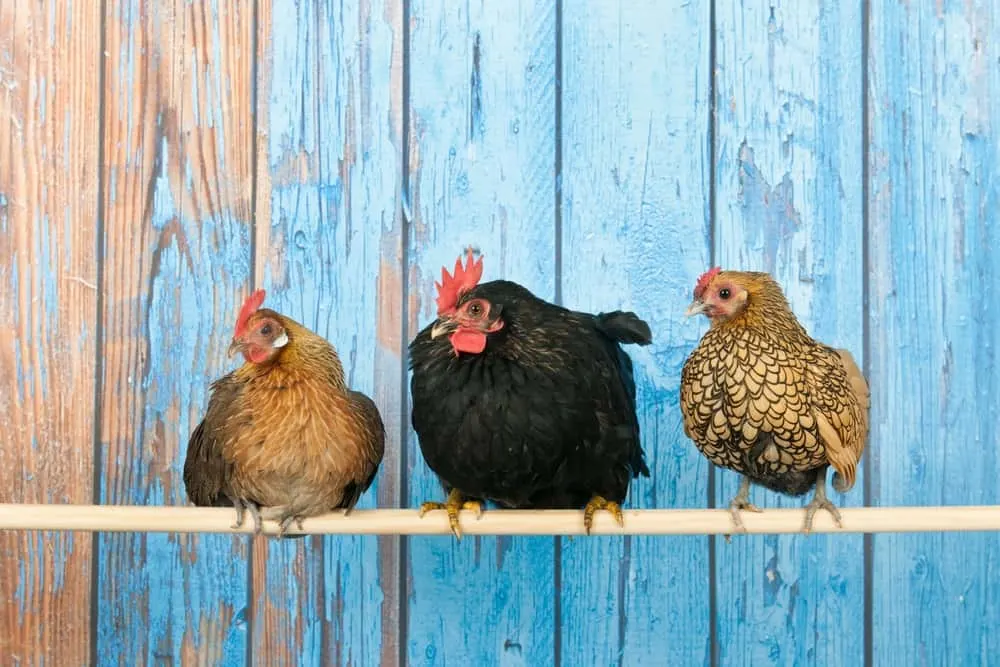
Bantam chickens – or mini chickens – are all the rage, especially for urban and suburban chicken keepers.
These tiny chickens are the ideal addition to any flock, and we’re here today to tell you exactly why that is.
Pin This To Save For Later
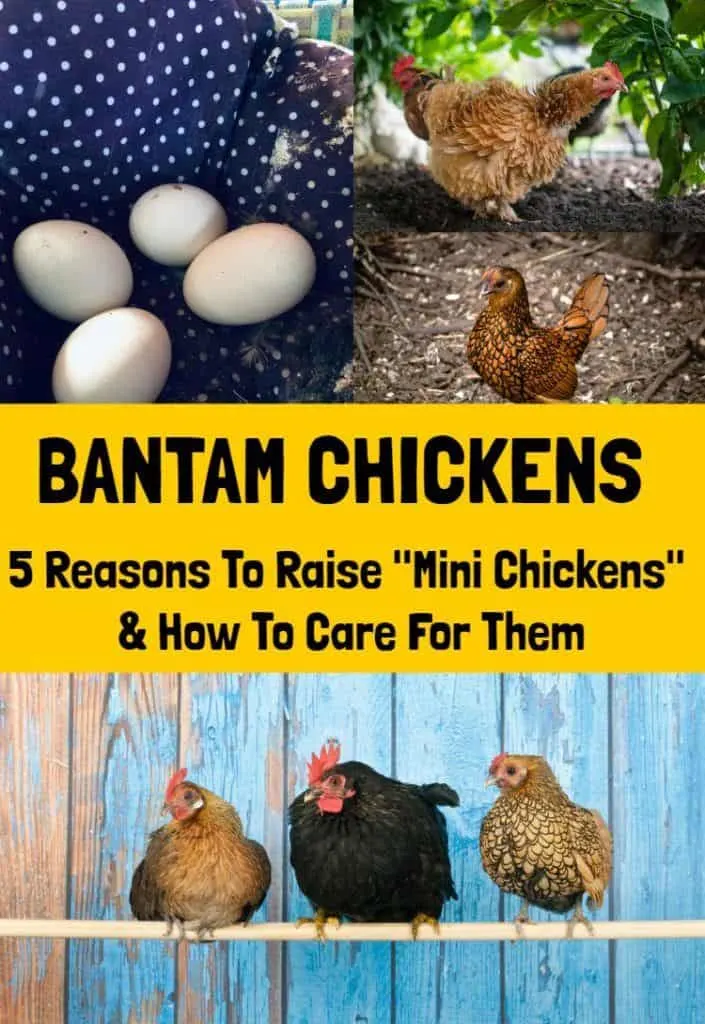
What Is a Bantam Chicken?
Bantam chickens are miniature chickens. They are roughly half the size of a standard chicken, sometimes even as small as one third the size.
These miniature chickens might be small in size, but they’re a wonderful addition to any flock. Bantams get their name from the city of Bantam in Indonesia, where many of these small breeds were discovered.
Types of Bantam Chickens
Bantam chickens come in two specific categories: true and developed.
True bantam breeds are chickens that naturally occur in this small size and have no standard sized counterpart. Popular breeds include Nankin, Sebright and Rosecomb.
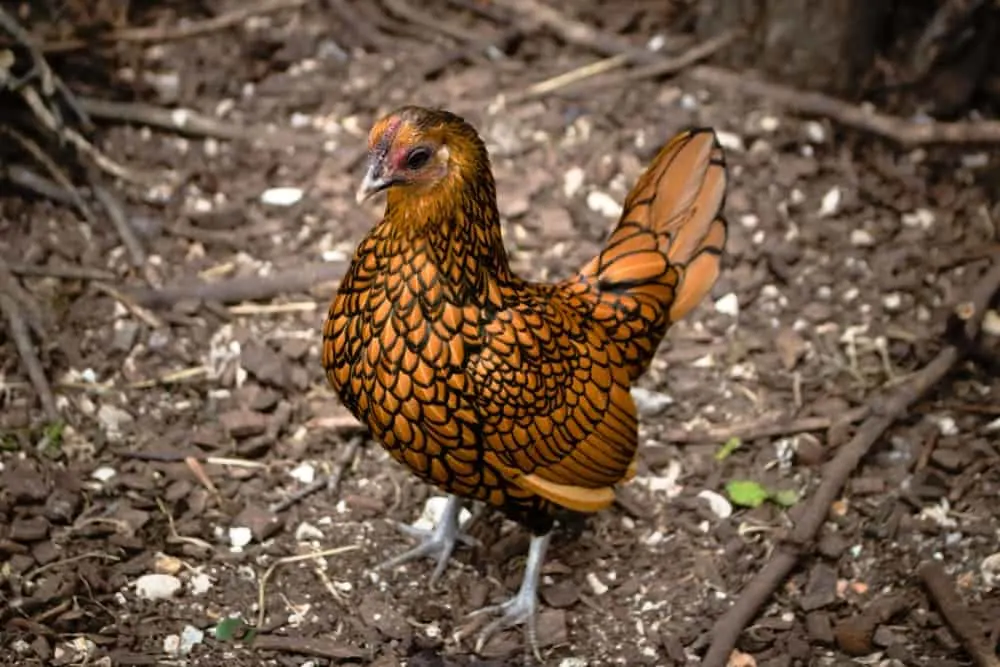
Developed bantam chickens are chickens that have been bred small from larger breeds. Popular breeds include Booted, Frizzle, Pekin and Japanese.
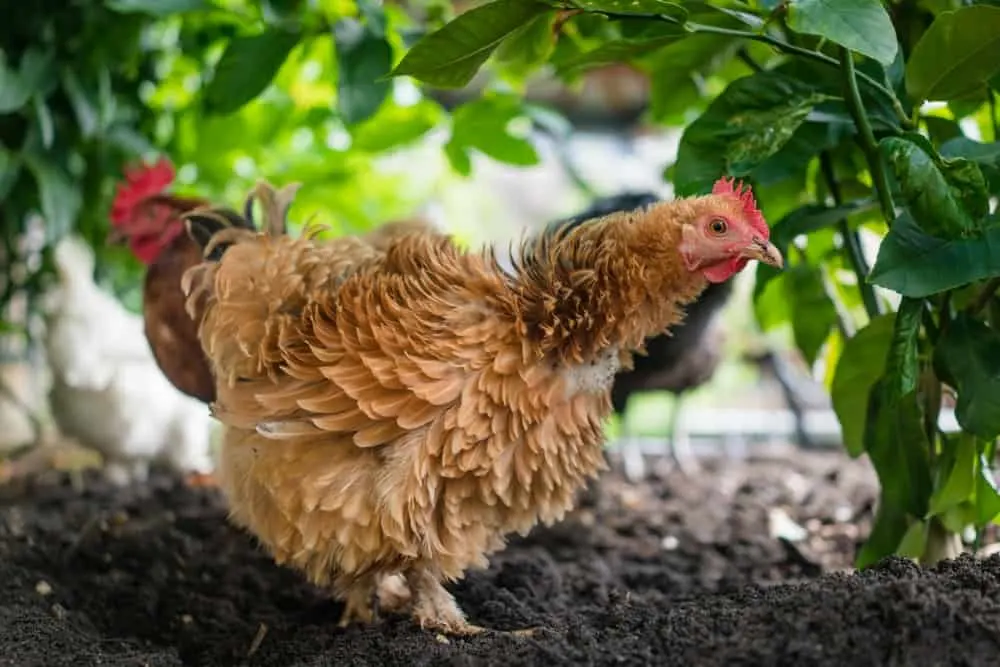
Most bantam breeds that you’ll find at hatcheries and farm stores were bred to be miniature types of popular chicken breeds.
Bantam Chicken Characteristics
Most bantam chickens weigh a little more than a pound. They stand just a foot tall and have delicate features. They may be small, but they’re also tough. Bantam breeds will live just as long if not longer than standard chickens.
Bantam Chicken Eggs
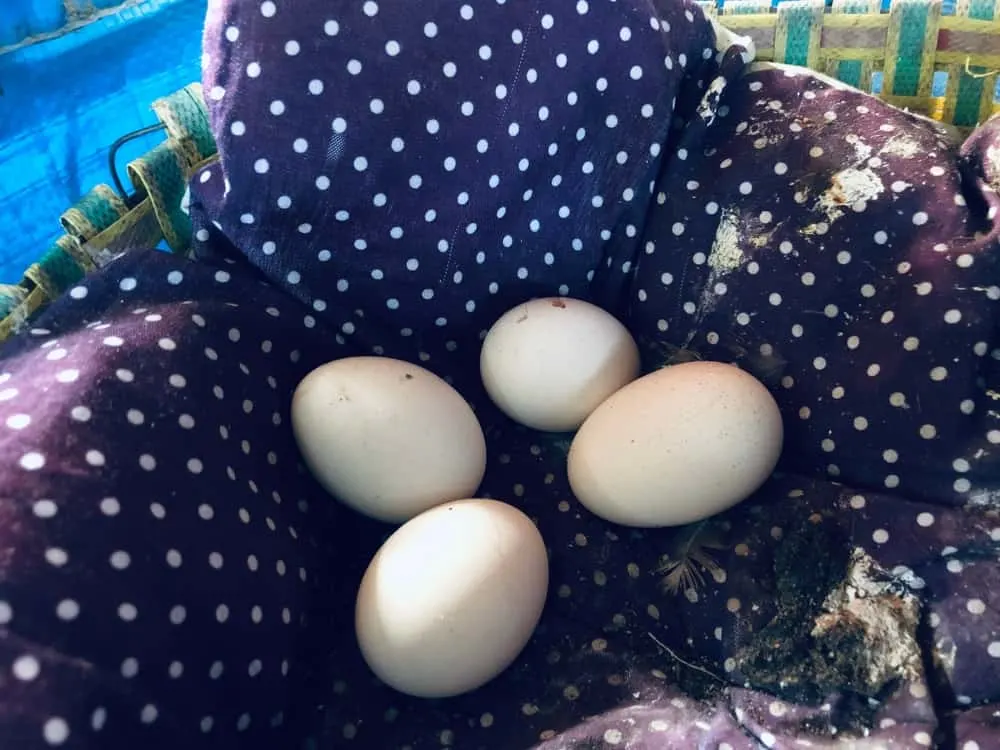
Just like the chickens themselves, bantam eggs are miniature in size. You can expect bantam eggs to be roughly half the size of standard chicken eggs.
5 Reasons You Should Consider Raising Bantam Chickens
1. They take up less coop space, which means more chickens for you!
The small size of bantams is a big win in the chicken coop.
These little birds take up much less space in the coop than standard breeds, which means you could fit a few more chickens in your flock!
2. Bantam chickens make great pets
Bantam breeds tend to have sweet personalities, especially if handled a lot as chicks. Breeds like the Silkie love to cuddle with their human friends, and make wonderful pets!
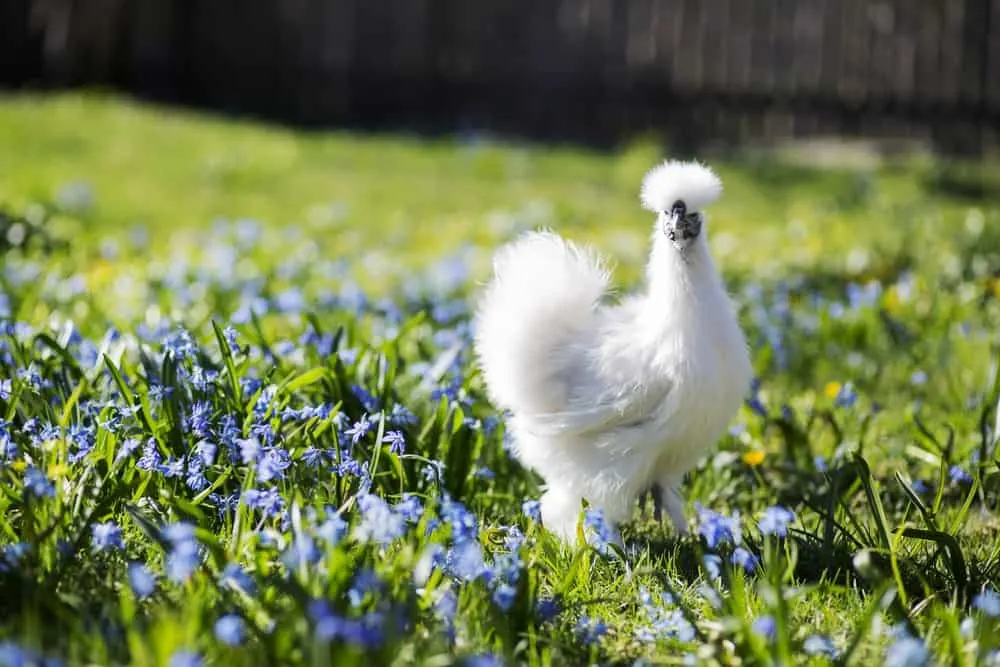
3. Bantams are good with kids
If you have small children that love to help with chicken chores, bantam breeds are a great choice. These tiny chickens are easy for kids to handle and tend to have sweet dispositions.
4. Save on chicken feed
Small birds eat less than big birds, plain and simple. Bantam breeds require about half as much chicken feed as standard breeds. This can save you a ton of money on feed, treats, and supplements.
5. Easy to handle
If you’ve ever dealt with a chicken struggling to get out of your grasp or running away from you, then you know how difficult full sized chickens can be to handle. Bantam chickens weigh only a few pounds at most, making it easy not only to catch and handle them, but care for them.
Caring for Bantam Chickens
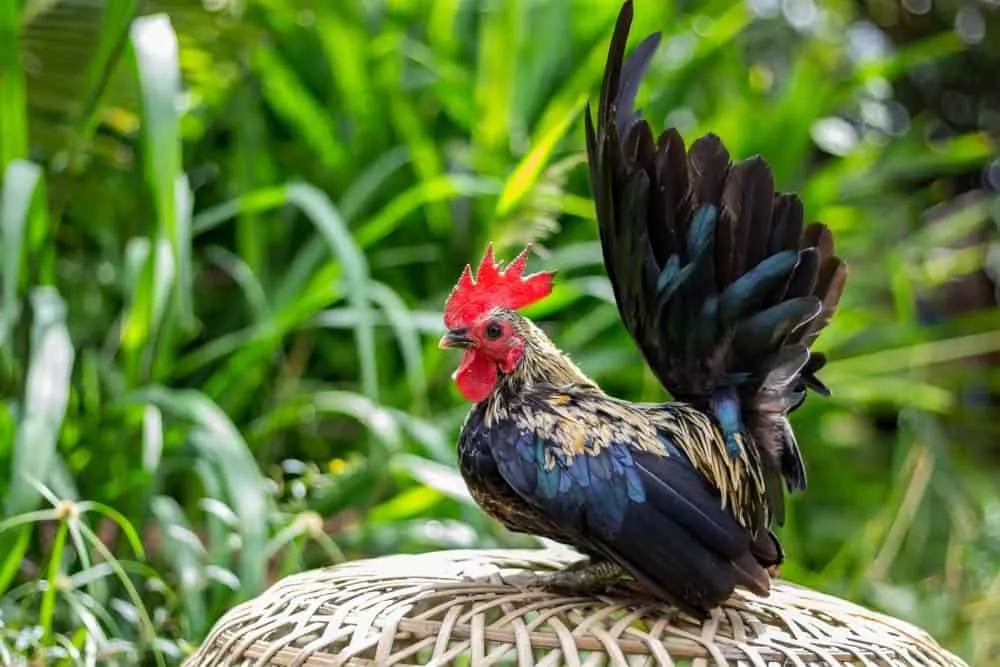
For the most part raising bantam chickens is the same as standard chicken care. They, too, need a safe and draft proof shelter, fresh water, healthy food, and time outdoors.
There are, however, three things to keep in mind when caring for bantam breeds.
Climate
While all chickens need to be protected from the elements, it’s especially true with bantam breeds.
The small stature of these birds puts them at greater risk for hypothermia in cold climates. This is not to say you can’t raise bantams in these climates, but you’ll need to take more steps to protect them.
Insulating the chicken coop, keeping it free from drafts, and feeding hearty winter foods will all help protect bantams against the cold.
Predators
There’s no doubt that bantam breeds are more susceptible to predator attacks. These tiny chickens can be easily carried off by attacking hawks and eagles, whereas larger chickens tend to be too heavy for these predators.
Bantam breeds also tend to be slower to move due to their short legs. If a predator attacks your flock, the bantams may not be able to keep up with the larger chickens, and could be the first to be attacked. Bantams also stand out to predators as an easy target because of their small size.
Bullying
In our experience, bantam breeds can be more susceptible to bullying from larger breeds.
We’ve been raising a mixed flock of bantam and standard breeds for many years. Most of our chickens get along great with each other regardless of size, but there are some times that the bantams get picked on by the standard breeds.
This behavior varies from flock to flock, and it’s hard to know if you’ll have issues with bullying until you try.
For the most part, bantams and standard chickens that are raised together from chicks to adulthood will get along without bullying. However, introducing new chickens to the flock can lead to bullying behavior.
The Final Word
Even though caring for bantam breeds comes with some challenges, we encourage you to give these adorable chickens a chance.
Bantam breeds are sure to bring joy and whimsy to your backyard flock, and those tiny eggs are just too cute to resist! And if bantams aren’t small enough and easy enough for you, try raising quail.
11 Reasons to Raise Quail Instead of Ducks or Chickens + How to Get Started
Related Reading: 10 Things Nobody Tells You About Raising Chickens
Pin This To Save For Later

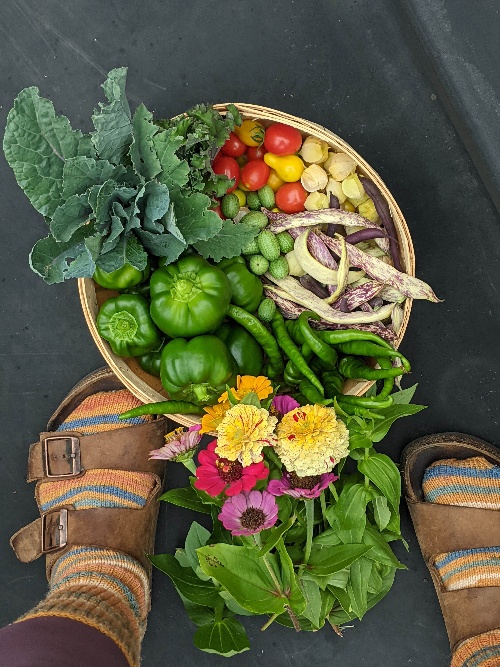
Get the famous Rural Sprout newsletter delivered to your inbox.
Including Sunday musings from our editor, Tracey, as well as “What’s Up Wednesday” our roundup of what’s in season and new article updates and alerts.

